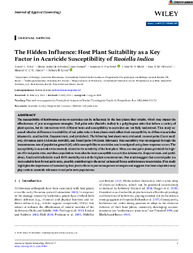Embrapa Semiárido
Publicações
The Hidden influence: host plant suitability as a key factor in Acaricide susceptibility of Raoiella indica.
Autoria: SILVA, D. L.; GOMES, M. I. de O. L.; PAZ NETO, A. A.; MELO, J. W. S.; OLIVEIRA, J. E. de M.; GONDIM JÚNIOR, M. G. C.; LIMA, D. B.
Resumo: The susceptibility of herbivorous mites to acaricides can be influenced by the host plants they inhabit, which may impact the effectiveness of pest management strategies. Red palm mite (Raoiella indica) is a polyphagous mite that infests a variety of plant species, but its interactions with different hosts and susceptibility to acaricides are not fully understood. This study assessed whether differences in suitability of red palm mite to host plants could affect their susceptibility to different acaricides (abamectin, azadirachtin, fenpyroximate, and pyridaben). The following host plants were evaluated: coconut palm (Cocos nucifera), christmas palm (Adonidia merrillii), and foxtail palm (Wodyetia bifurcata). Host suitability was investigated through the instantaneous rate of population growth (ri), while susceptibility to acaricides was investigated using dose-response curves. The susceptibility to acaricides was inversely related to the suitability of the host plant. Thus, coconut palm plants provided the highest ri for red palm mite, and these populations were also the least susceptible to acaricides (abamectin, fenpyroximate, and pyridaben). Azadirachtin failed to reach 100% mortality even at the highest concentrations. Our results suggest that coconut palm is a more suitable host for red palm mite, possibly contributing to the mites' enhanced fitness and tolerance to acaricides. This study highlights the importance of considering host plant effects in pest management strategies and suggests that host adaptation may play a role in acaricide tolerance in red palm mite populations.
Ano de publicação: 2025
Tipo de publicação: Artigo de periódico
Unidade: Embrapa Semiárido

